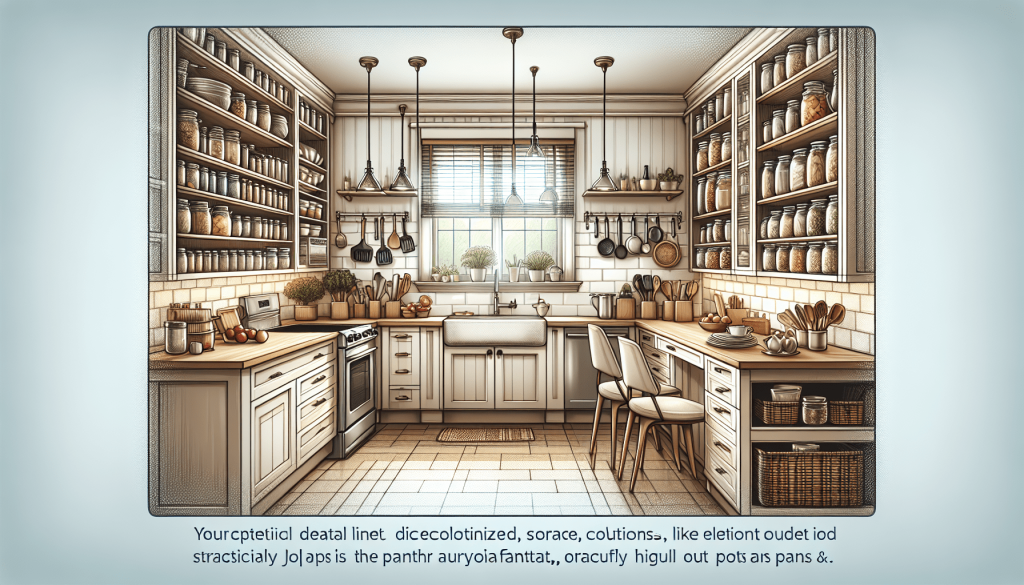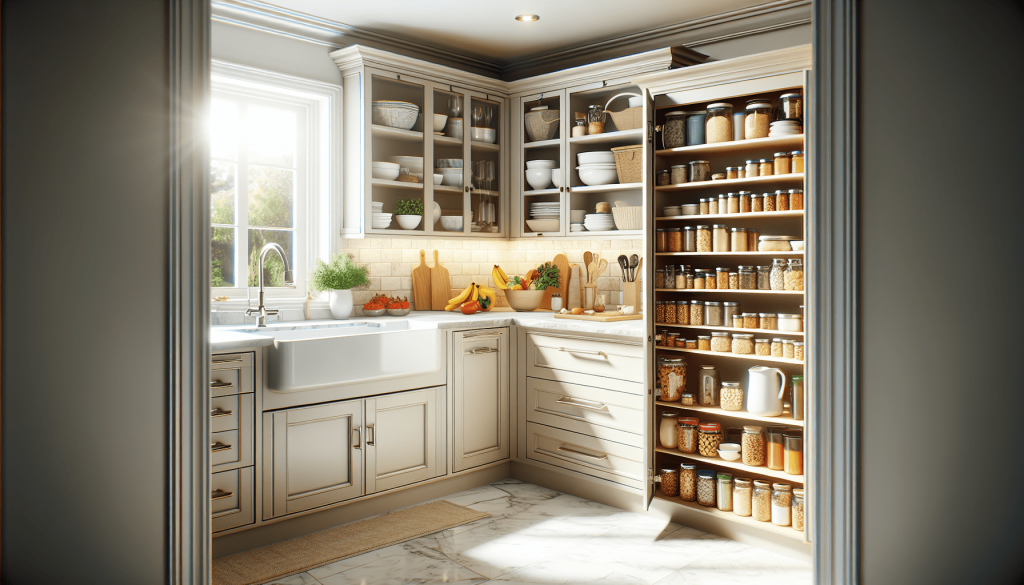Keeping your kitchen clean and organized can sometimes feel like a never-ending task, but with a few simple strategies, you can maintain a tidy space that is both functional and inviting. From decluttering countertops to implementing a regular cleaning schedule, these top ways will help you create a kitchen environment that promotes efficiency and peace of mind. Whether you’re a seasoned chef or just starting out in the culinary world, these tips will make it easier for you to prepare meals and enjoy your time in the heart of your home.

Declutter Your Countertops
Put away appliances and utensils
One of the first steps to decluttering your countertops is to put away any appliances and utensils that are not in regular use. While it may be convenient to keep certain items out for easy access, having too many appliances and utensils cluttering your countertops can make your kitchen feel chaotic and disorganized. Take a look at the appliances and utensils you have out and ask yourself if you really need them all readily available. If the answer is no, find a designated storage space for them in your cabinets or drawers.
Use storage containers
Storage containers can be a lifesaver when it comes to decluttering your countertops. Whether it’s mason jars for storing dry goods like flour and sugar or clear storage bins for corralling everyday items, using storage containers can help keep your countertops neat and tidy. Consider investing in airtight containers to keep your pantry items fresh and organized. Additionally, using smaller containers within your cabinets and drawers can help further prevent clutter and make it easier to find what you need.
Limit items on display
While it’s tempting to display your collection of decorative items or sentimental trinkets on your countertops, it’s important to strike a balance between functionality and aesthetics. Limiting the number of items on display can help create a clean and organized look in your kitchen. Choose a few key items that truly bring you joy and find a designated space for them. By keeping your countertops clear of excessive clutter, you’ll create a more efficient and enjoyable cooking environment.
Organize Your Cabinets and Drawers
Sort and group similar items together
One of the most effective ways to keep your cabinets and drawers organized is to sort and group similar items together. Start by emptying out your cabinets and drawers and categorizing items based on their use. For example, group all your baking supplies together, separate your glasses from your mugs, and keep your plates and bowls in a separate stack. Sorting your items in this way will make it much easier to find what you need when you’re in a rush.
Utilize drawer dividers and organizers
Drawer dividers and organizers are your best friends when it comes to keeping your cabinets and drawers tidy. These handy tools can help you maximize the space and prevent items from getting jumbled together. Whether you’re storing utensils, cutlery, or small kitchen gadgets, utilizing dividers and organizers will make it easier to find what you need and ensure that everything has a designated place.
Label containers and shelves
To take your cabinet and drawer organization to the next level, consider labelling your containers and shelves. This simple step can save you time and frustration when searching for specific items. Labeling can be as simple as using a label maker or even writing directly on the containers and shelves with a marker. Not only will this help you stay organized, but it will also make it easier for other family members or guests to find what they need in your kitchen.
Clean as You Cook
Wipe down surfaces while preparing meals
One of the most effective ways to keep your kitchen clean and organized is to clean as you cook. While waiting for your food to simmer or bake, take a few minutes to wipe down surfaces and clean up any spills or messes. This not only keeps your countertops looking spotless, but it also prevents food debris from accumulating and potentially attracting pests. Keep a damp cloth or sponge nearby to quickly tackle any messes that arise during meal preparation.
Wash dishes and utensils immediately
Leaving dishes and utensils to pile up in the sink not only creates an unsightly mess but also makes it more difficult to clean them later. Get into the habit of washing dishes and utensils immediately after using them. This will prevent them from cluttering your countertops and minimize the time and effort required for cleaning. If you have a dishwasher, load dirty dishes as you go to keep your sink area clear and make cleanup a breeze.
Dispose of waste and leftovers promptly
As you cook, it’s important to dispose of waste and leftovers promptly to prevent odours and maintain a clean environment. Designate a specific area for food scraps and empty it regularly to avoid unpleasant smells and attractants for pests. If you have leftovers, store them in airtight containers and make sure to label and date them. By disposing of waste and leftovers promptly, you’ll keep your kitchen clean and organized while also reducing the risk of foodborne illnesses.
Maintain a Cleaning Routine
Establish a daily cleaning schedule
To keep your kitchen clean and organized on a regular basis, it’s essential to establish a daily cleaning schedule. This schedule should include quick tasks such as wiping down countertops, sweeping the floor, and emptying the trash. By incorporating these tasks into your daily routine, you’ll prevent dirt and messes from accumulating and make it easier to maintain a clean and organized kitchen.
Deep clean once a week
In addition to your daily cleaning routine, it’s important to set aside time once a week for a deep clean. This involves tasks such as wiping down cabinets and appliances, scrubbing the sink, and washing any kitchen linens. Deep cleaning ensures that no areas are overlooked and helps maintain a high level of cleanliness in your kitchen. Consider setting aside a specific day or time each week for these deep cleaning tasks, so you can stay on top of them consistently.
Regularly sanitize surfaces
Germs and bacteria can easily build up on surfaces in the kitchen, so it’s crucial to regularly sanitize them. Use a mild disinfectant or a mixture of water and vinegar to wipe down countertops, tables, and other frequently touched areas. Pay extra attention to areas where raw meat and other potentially hazardous foods are prepared. By regularly sanitizing surfaces, you’ll create a healthier and more hygienic environment in your kitchen.

Properly Store Food
Follow food storage guidelines
Properly storing food is essential to both maintain its freshness and prevent any potential contamination. Make sure to follow food storage guidelines provided by the manufacturer or relevant food safety authorities. For example, refrigerate perishable items like dairy products and meats, store dry goods in cool, dry places, and pay attention to expiration dates. Taking these steps will not only keep your food fresh but also prevent foodborne illnesses.
Use airtight containers
Airtight containers are a kitchen essential when it comes to properly storing food. Invest in quality containers that seal tightly to keep air out and maintain the freshness of your ingredients. Use these containers to store leftovers, pantry items, and even bulk ingredients. The airtight seal will help prevent spoilage, keep pests away, and ensure that your food stays organized and accessible.
Label and date leftovers
Leftovers can easily get lost and forgotten in the back of the fridge if not properly labeled and dated. To prevent wastage and confusion, make it a habit to label and date any leftovers before storing them. This will make it easier to identify what each container holds and track their shelf life. Consider investing in reusable food storage labels or simply use masking tape and a marker to label your containers.
Keep the Sink and Dishwasher Clean
Empty and clean the sink daily
The sink is a focal point in any kitchen, so it’s important to keep it clean and free of dirty dishes. Make it a daily habit to empty and clean the sink, ensuring there are no food scraps or lingering residues. By starting with a clean sink, you’ll create a more inviting and hygienic space for meal preparation and cleanup. Remember to also clean the drain and faucet regularly to prevent any buildup and maintain functionality.
Regularly clean and maintain the dishwasher
If you have a dishwasher, ensure that it is regularly cleaned and maintained to keep it in optimal condition. Check the dishwasher’s manual for specific instructions, but generally, it’s recommended to clean the filter and spray arms periodically. Additionally, run an empty cycle with a dishwasher cleaner or a mixture of vinegar and baking soda to remove any odours or buildup. By taking care of your dishwasher, you’ll ensure it consistently delivers clean and sanitized dishes.
Wipe down countertops and faucet after use
After every use of the sink and faucet, take a moment to wipe down the surrounding countertops and faucet. This quick step will remove any water spots, splashes, or grime that may have accumulated. Not only will this keep your kitchen looking fresh and clean, but it will also help prevent the spread of bacteria and maintain a sanitary food preparation area.
Utilize Wall Space
Install hooks for hanging utensils and towels
To maximize your kitchen’s storage potential, make use of the wall space by installing hooks for hanging utensils and towels. This not only keeps these items easily accessible but also frees up valuable drawer space. Place hooks near your cooking area for quick access to commonly used utensils and hang towels within reach for easy cleanup. It’s a simple and effective way to keep your kitchen organized while adding a decorative touch.
Mount shelves for storing jars and spices
If you find yourself running out of cabinet and drawer space, consider mounting shelves on your kitchen walls. This provides additional storage space for jars, spices, and other frequently used items. Install the shelves near your cooking area for easy access and organize them in a visually appealing way. By utilizing wall-mounted shelves, you’ll free up precious cabinet space and create a functional and attractive kitchen.
Hang a magnetic board for displaying recipes
A magnetic board is a versatile tool that can help keep your kitchen organized and efficient. Use it to display your favorite recipes, meal plans, or even shopping lists. By having important information easily visible, you’ll save time searching for recipes and stay on top of your meal planning. Hang the magnetic board in a convenient location and use magnets or clips to securely hold your paper or index cards.
Designate Zones for Different Tasks
Create a designated prep area
Having a designated prep area in your kitchen can greatly streamline your meal preparation process. Choose a well-lit and clean section of your countertop and designate it as your primary prep area. Here, you can chop vegetables, measure ingredients, and assemble meals without having to search for necessary tools and ingredients. By keeping everything you need within reach, you’ll be able to efficiently move through the cooking process.
Set up a cooking zone with essential tools and ingredients
Similar to a designated prep area, setting up a cooking zone can greatly enhance your efficiency in the kitchen. Gather your essential cooking tools, such as pots, pans, and spatulas, and keep them within easy reach of your stovetop. Arrange your frequently used cooking ingredients nearby as well. By creating a dedicated cooking zone, you’ll eliminate the need to search for items during the cooking process and minimize the chances of burning or overcooking your meals.
Allocate a cleaning station for sponges and cleaning supplies
Keeping cleaning supplies and sponges easily accessible is crucial for maintaining a clean kitchen. Allocate a specific area, such as under the sink or in a cupboard, as your cleaning station. Store all your cleaning supplies, including dish soap, sponges, and scrub brushes, in a designated container to keep them organized and prevent spills. Having a readily accessible cleaning station will make it easier to clean up any spills or messes as they occur, ensuring a consistently clean and tidy kitchen.
Implement Proper Waste Management
Separate recyclables from non-recyclables
Proper waste management is essential for maintaining an environmentally friendly and organized kitchen. Make sure to separate recyclable items, such as glass, plastic, paper, and metal, from non-recyclables. Have dedicated recycling bins in your kitchen and educate your household members on what can be recycled. This simple step can significantly reduce landfill waste and contribute to a cleaner, more sustainable environment.
Use compost bins for organic waste
If you generate organic waste, such as fruit and vegetable scraps, consider setting up a compost bin in your kitchen. Composting allows you to divert food waste from landfills and create nutrient-rich soil for your garden. Use a small, odor-resistant compost bin and regularly empty it into your outdoor compost pile or community composting facility. By properly managing your organic waste, you’ll reduce your environmental footprint and take a step towards a greener kitchen.
Dispose of hazardous materials correctly
Certain items in your kitchen, such as old batteries, expired medications, or cleaning chemicals, should not be thrown in the regular trash. Properly disposing of hazardous materials is crucial for maintaining a safe and clean kitchen. Research local guidelines for disposing of hazardous waste and follow the instructions provided. This will help protect the environment and prevent any potential harm to humans or wildlife.
Regularly Deep Clean Appliances
Clean the oven and stovetop
Regularly cleaning your oven and stovetop is essential for maintaining a clean and efficient kitchen. Grease and food residue can build up over time, leading to unpleasant odours and potentially affecting the performance of your appliances. Follow the manufacturer’s instructions for cleaning your oven, including removing and cleaning oven racks. For the stovetop, wipe down the burners, control knobs, and surrounding areas with a mild cleanser or vinegar and baking soda paste. By regularly deep cleaning these appliances, you’ll ensure their longevity and keep your kitchen in top shape.
Descale the kettle and coffee maker
Over time, mineral deposits can build up inside your kettle and coffee maker, affecting the taste of your beverages and potentially damaging the appliances. Descaling these appliances is essential to keep them in optimal condition. Consult the manufacturer’s instructions for the recommended descaling method or use a mixture of equal parts water and vinegar. By regularly descaling your kettle and coffee maker, you’ll extend their lifespan and enjoy better tasting beverages.
Degrease the range hood
The range hood plays a crucial role in keeping your kitchen free of grease and odours, but it can quickly accumulate buildup and become less effective. Regularly degreasing the range hood is essential for maintaining proper airflow and preventing excessive grease from collecting on surfaces. Remove and clean the filters according to the manufacturer’s instructions and wipe down the exterior with a mild degreaser or a mixture of vinegar and water. By keeping your range hood clean, you’ll ensure that your kitchen stays fresh and free of greasy residue.
In conclusion, keeping your kitchen clean and organized requires consistent effort and a well-established routine. By decluttering your countertops, organizing your cabinets and drawers, cleaning as you cook, maintaining a cleaning routine, properly storing food, keeping your sink and dishwasher clean, utilizing wall space, designating zones for different tasks, implementing proper waste management, and regularly deep cleaning appliances, you can create a functional and inviting kitchen that inspires you to cook and enjoy time with family and friends. Remember, a clean and organized kitchen is not only pleasing to the eye but also promotes a healthy and stress-free cooking experience.
